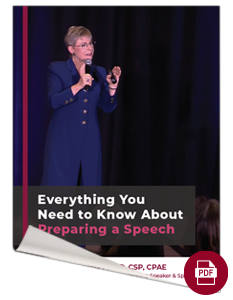You’re waiting your turn to make a speech, when suddenly you realize that your stomach is doing strange things and your mind is rapidly going blank. How do you handle this critical time period?
People ask me this question in all my speaking classes, but there is no single answer. You need to anticipate your speech mentally, physically, and logistically.
MENTALLY:
Start by understanding that you’ll spend a lot more time preparing than you will speaking. As a general rule, invest three hours of preparation for a half hour speech, a six to one ratio. When you’ve become a highly experienced speaker, you may be able to cut preparation time considerably in some cases, but until then, don’t skimp. Part of your preparation will be to memorize your opening and closing — three or four sentences each. Even if you cover your key points from notes, knowing your opening and closing by heart lets you start and end fluently, connecting with your audience when you are most nervous.
LOGISTICALLY:
Go to the room where you’ll be speaking as early as possible so you can get comfortable in the environment. If you will be speaking from a stage, go early in the morning when no one is there and make friends with the stage. Walk around on the area where you will be speaking, so the first time there is not when you deliver your talk.Then, during your presentation, you can concentrate on your audience, not your environment.
PHYSICALLY:
A wonderful preparation technique for small meetings is to go around shaking hands and making eye contact with everybody beforehand. For larger meetings, meet and shake hands with people in the front row at least, and some of the people as they are coming in the door. Connect with them personally, so they’ll be rooting for your success. We as speakers are rarely nervous about individuals, only when faced with the thought of an audience. Once you’ve met the audience or at least some of them, they become less scary.
It’s totally natural to be nervous. Try this acting technique. Find a private spot, and wave your hands in the air. Relax your jaw, and shake your head from side to side. Then shake your legs one at a time. Physically shake the tension out of your body.
Try not to sit down too much while you’re waiting to speak. If you’re scheduled to go on an hour into the program, try to sit in the back of the room so that you can stand up occasionally. It is hard to jump up and be dynamic when you’ve been relaxed in a chair for an hour. (Comedian Robin Williams is well known for doing “jumping jacks” to raise his energy level before going on stage.) Sitting in the back also gives you easy access to the bathroom and drinking fountain. There’s nothing worse than being stuck down front and being distracted by urgent bodily sensations.
Read More...

